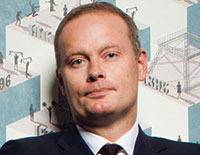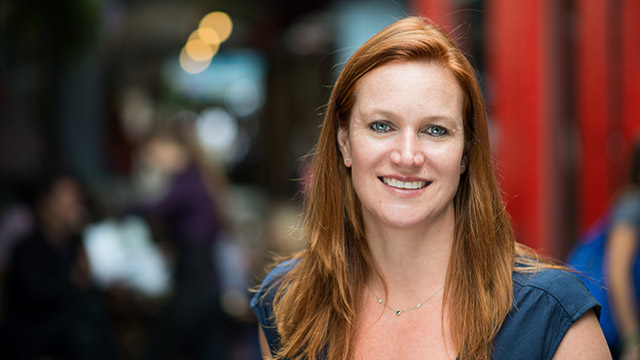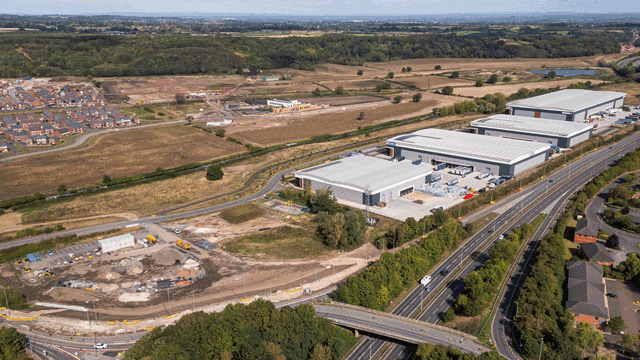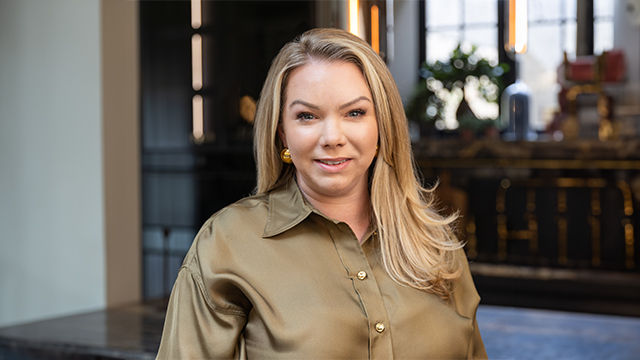 Quintain has been through the wringer over the last five years. Its share price collapsed as the City lost confidence in the company’s strategic direction. Founder Adrian Wyatt left the business, and a new management team was brought in. And the language of some of its most recent pronouncements – “exit non-core assets… reduce group debt… intensify the focus” – suggest a business that has been more back foot than front.
Quintain has been through the wringer over the last five years. Its share price collapsed as the City lost confidence in the company’s strategic direction. Founder Adrian Wyatt left the business, and a new management team was brought in. And the language of some of its most recent pronouncements – “exit non-core assets… reduce group debt… intensify the focus” – suggest a business that has been more back foot than front.
Chief executive Max James acknowledges as much: ?“We have been on a really interesting journey – to use that horrible phrase – over ?the last 16 months.”
Horrible phrase it may ?be, but James, 46, is not looking to play on a challenged, X Factor-style corporate back story. He’s looking forward, especially to two weeks’ time, when he gets a chance to show his peers and his investors that Quintain is back on the front foot. The opening of the London Designer Outlet in Wembley is, he believes, the start of a new chapter for the business.
An F and two Ds
Having switched from a career as an investment banker to principal two-and-a-half years ago, James is clearly relishing the prospect of moving beyond his first phase at Quintain of “educating investors and trying to attract new capital”. And like all good business leaders, he has a pet phrase to describe ?his company’s transition: ?“The three Ds were to dispose – because focus doesn’t begin with a D – de-lever and deliver.” Delivery being in Wembley.
Phase one of the project ?will see 1.8m sq ft of mixed-use space developed, including ?500 homes. With 5,000 more planned, talk of transformation is not overblown.
But with the outlet opening just days away, James is keen to talk about the shopping and leisure offer. “There is around 280,000 sq ft of new retail ?up there,” he says. “It is the first time London will have?a dedicated outlet in town, within the M25. But it is a bit of a hybrid because it also has close to 15 restaurants and bars and a large cinema. What the combination of these things does is to drag and attract people into Wembley, in addition obviously to the stadium and the arena. But also it means that all those facilities that we take for granted – like Pret-a-Manger on the way to work, or indeed a decent dinner in the evening – all those things will be there.
“Our strategy for Wembley has been to make sure ?that, dare I say it, the bare essentials of life, things that attract people to that part of London, are in place and then we will start developing out the residential early next?year. So we are in this very interesting six-month phase where I think, and I genuinely hope, that Wembley really goes back on people’s radar.”
Of course, there is a branding exercise on the ?way, though Wembley Park ?as a destination will already ?be familiar to those with a passing knowledge of the ?area. And just as there was a Stratford before the Olympics transformed the borough, Wembley Park mark two will be a different incarnation.
The Barings years
James is full of enthusiasm now, but he had to be persuaded to join Quintain from Lowndes Partners, the real estate investment bank he founded in 2006. “It wasn’t ?an easy decision when you’re
running your own business,” ?he says. But it wasn’t his first career switch. He disappointed his architect father by abandoning his architecture studies to go into the City, putting paid to an unspoken understanding that he would take over the family firm. Armed with an MBA, he battled through a deep recession to get into the City. He landed at Barings in 1992.
“When I joined we had a market not dissimilar to the one that we have experienced for the last couple of years, so you had to roll up your sleeves. We were doing emergency rights issues, convertible bonds and debentures to get our hands ?on the money for property companies. And then it moved into more of the M&A world.”
Three years later, thanks to Nick Leeson, the bank imploded.
“It came – ironically – at a point in time when Barings had its annual bonus review and we were all congratulating ourselves and feeling very good about the world. Then the rumour goes around that you had better drink up quickly because the bank’s gone bust. Of course, we completely ignored that and ordered ?an even larger drink.
“Come Saturday morning, having run around the park to try to get rid of the hangover, the phone goes and the order ?is to get into the office and ?start working on business plans. I was a knee-high analyst or associate at the time, so obviously the guys in more senior positions probably had much more stress. But it ?was an interesting period.
“Moments like that mean that you grow up a bit, in terms of what your perceptions are ?of the world and how the financial world really works for you. You learn pretty quickly who are the good guys and the bad guys. When you look back, maybe from a slight distance, the lesson that you learn is that what you think might happen is not necessarily what will happen. You pass your interview, you’ve got a nice job for the foreseeable future and these things can sway the boat.
“What you take from that?is you can’t prepare for these black-swan events, but you can certainly make sure that you take a view whereby if events do occur, you don’t get too thrown about by them.”
Lazard and Quintain
In 1997, James left Barings ?for Lazard, where he worked alongside the likes of MEPC and Canary Wharf – still the property company he admires most. It was at Lazard that he met William Rucker, who years later, as chairman of Quintain, would hire him again.
After that came a period ?as global head of real estate?at HSBC between 2003 and 2006. It is a perverse way ?of looking at a legacy, but the ?fact that the bank avoided overlending to property on his watch is a real mark of success. “You had people like Lehmans, even Barclays, who were really punching quite aggressively, as well as RBS. You looked at the performance of those guys in terms of what they were doing and HSBC looked as if it was slightly slow. With hindsight, we can now look back and say that more cautious approach probably paid dividends.”
With the £39m sale of Quintain’s last regional assets – the Sequel portfolio – last week, Quintain’s transition to ?a specialist London developer and asset manager is largely complete. The market appreciates the focus. Quintain’s share price was hovering around 84p at the time of writing, up from its 12-month trough in the low 50s, but still a long way off?its near £10 mark in 2007.
Life beyond Wembley and Greenwich – where the joint venture with Knight Dragon agreed in summer 2012 was instrumental in getting the business on the right footing – is something that occupies more of James’s working hours. He is mulling just how significant the private rented sector could be at both schemes and, like many others, is watching Delancey’s and Qatari Diar’s efforts in Stratford with more than a little interest. He maintains that development in prime central London is also an option for Quintain, though resi in the doughnut beyond seems more likely. “We really want to be known as a London player,” ?he says. “It’s an astonishing economy in London.”
And, says James, more is to come. “You will begin to see more of Quintain,” he says. “This is part of our coming-out process. We have been introspective over the past five or six years post-credit crisis. We now have the confidence to start communicating with the market and showing people what we have done: Wembley over the next six months, ?and Greenwich following that as we bring the residential forward there.”
It looks as though the next five years will be considerably kinder to Quintain than the last five.
damian.wild@estatesgazette.com
To watch the face-to-face interview with max james, go to http://bcove.me/nktb6g7x










